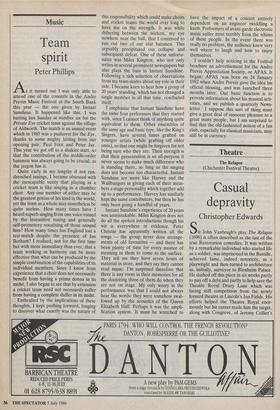Music
Team spirit
Peter Phillips
As it turned out I was only able to attend one of the concerts in the Andre Previn Music Festival at the South Bank this year — the one given by Instant Sunshine. It happened like this. I was batting last Sunday at number six for the Private Eye cricket team against the village of Aldworth. The match is an annual event which in 1985 was a pushover for the Eye, thanks to some mighty hitting from our opening pair, Paul Foot and Peter Jay. This year we got off to a shakier start, so that the contribution of the middle-order batsmen was always going to be crucial, as the jargon has it.
Quite early in my lengthy if not run- drenched innings, I became obsessed with the inescapable verity that playing in a cricket team is like singing in a chamber choir. Any one member of either may be the greatest genius of his kind in the world, yet the team as a whole may nonetheless be quite useless. How many times have I heard superb singing from one voice ruined by the insensitive tuning and generally self-promotory vocalising of those around him? How many times has England lost a test-match despite the presence of Ian Botham? I realised, not for the first time but with more immediacy than ever, that a team working in harmony can be more effective than what can be produced by the simple combination of the capabilities of its individual members. Since I know from experience that a choir does not necessarily benefit from having a prima donna in its midst, I also began to see that by extension a cricket team need not necessarily suffer from having a complete duffer in its midst.
Enthralled by the implications of these thoughts, I kept pushing forward, longing to discover what exactly was the nature of this responsibility which could make choirs and cricket teams the world over long to have me on the strength. It was while dithering between the wickets, my eye nowhere near the ball, that I contrived to run out two of our star batsmen. This arguably precipitated our collapse and subsequent defeat. One of these unfortu- nates was Miles Kington, who not only writes in several prominent newspapers but also plays the bass in Instant Sunshine. Following a rich selection of observations from my team-mates about my role in their side, I became keen to hear how a group of 20 years' standing, which has not changed a single member in all that time, conducted itself.
I emphasise that Instant Sunshine have the same four performers that they started with, since I cannot think of anything quite equivalent to them. Other ensembles of the same age and basic type, like the King's Singers, have several times grafted on younger artists (while grafting off older ones), so that one might be forgiven for not being sure who they are. Their strength is .that their presentation is so all-purpose it never seems to make much difference who is standing there, so long as the singing does not become too characterful. Instant Sunshine are more like Harvey and the Wallbangers in giving each of their mem- bers a stage personality which together add up to a performance. Harvey has similarly kept the same contributors, but then he has only been going a handful of years.
Instant Sunshine's experience of 20 years was unmistakable. Miles Kington does not do all the spoken introductions though his wit is everywhere in evidence. Peter Christie has apparently written all the songs — the group never does arrange- ments of old favourites — and there has been plenty of time for every nuance of meaning in them to come to the surface. They tell me they have seven hours of material in store, and they say they cannot read music. I'm surprised therefore that there is any room in their memories for all the doctoring three of them do when they are not on stage. My only worry in the performance was that I could not always hear the words: they were somehow swal- lowed up by the acoustics of the Queen Elizabeth Hall. Perhaps it was the ampli- fication system. It must be wretched to have the impact of a concert entirely dependent on an engineer twiddling a knob. Performers of avant-garde electronic music suffer most terribly from the whims of these people. In the event there was really no problem, the audience knew very well where to laugh and how to enjoy themselves.
I couldn't help noticing in the Festival brochure an advertisement for the Andre Previn Appreciation Society, or APAS. It began: APAS 'was born on 24 January 1982 when Andre Previn gave the idea his official blessing, and was launched three months later. Our basic function is to provide information about his musical acti- vities, and we publish a quarterly News- letter.' I suppose this sort of thing must give a great deal of innocent pleasure to a great many people; but I am surprised to find that the old-fashioned notion of a fan club, especially for classical musicians, may still be in currency.


















































 Previous page
Previous page